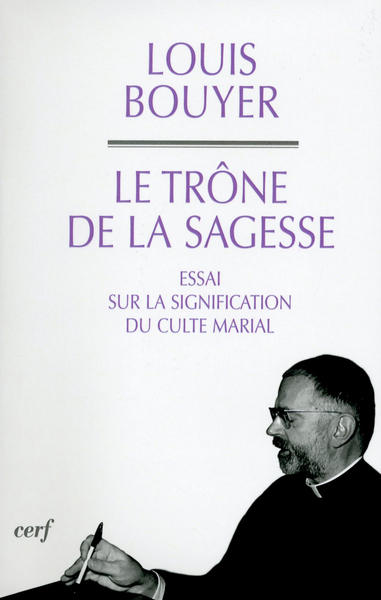- EAN13
- 9782204098267
- Éditeur
- Cerf
- Date de publication
- 7 juin 2012
- Collection
- BIBLIO DU CERF
- Dimensions
- 20 x 13,1 x 2,4 cm
- Poids
- 348 g
- Langue
- fre
Le Trône De La Sagesse
Louis Bouyer
Cerf
Prix public : 24,00 €
Entre tous les livres publiés en l'honneur de la Sainte Vierge, celui-ci mérite une place à part : c'est une synthèse doctrinale, un livre de théologie mariale. C'est aussi et surtout une anthropologie surnaturelle que le Père Bouyer nous présente, une anthropologie vue sous l'angle typique de la figure de Marie. " Tous les thèmes familiers à la méditation chrétienne sont repensés par le fond, avec une force sobre et vigoureuse, méfiante pour tous les excès imprudents... Et si le protestantisme est sévèrement blâmé pour son incompréhension du mystère mariologique, l'auteur par sa connaissance intime des sensibilités réformées nous a pourtant fourni le seul livre sur ce sujet que l'on peut avec bonne conscience conseiller à un lecteur protestant. On connaît en outre les affinités du Père Bouyer avec la pensée orientale... Méthode de pensée essentiellement dialectique parce que souple et englobante, mais jamais molle, jamais diplomatique, au besoin même guerrière : un humanisme fier de sa noble ascendance : Athanase et Antoine, Citeaux avec son "amour des lettres" et son "désir de Dieu", Érasme, Newman... Et à travers tout un souci œcuménique par instinct. En Marie se trouve sauvegardée, exaltée par Dieu lui-même, la noblesse de la femme, sa créature, envers qui le Fils éternel se comporte en parfait gentilhomme. " (Hans Urs von Balthasar) -- Of all the books published in honour of the Blessed Virgin, this one deserves special recognition as a doctrinal synthesis and a book of Marian theology. But Father Bouyer also, and above all, brings us a supernatural anthropology, one viewed from the characteristic angle of the figure of Mary. 'All the familiar themes of Christian meditation are rethought in depth, with sober and vigorous force, and wariness of imprudent excess... And if Protestantism is severely reprimanded for its incomprehension as regards the Marian mystery, the author, who possesses intimate knowledge of Reformist sensibilities, has nevertheless produced the only book on this subject that one can, in good conscience, recommend to a Protestant reader. Besides, we know of Father Bouyer's affinities with Eastern thinking... 'An essentially dialectical method of thinking because it is flexible and inclusive, though never wishy-washy, never diplomatic, and can be warlike if necessary: a humanism that is proud of its noble ancestry: Athanasius and Antony, Citeaux with his "love of letters' and his "desire for God', Erasmus, Newman... and, traversing everything, an instinctive concern for ecumenism. In Marie is conserved, exalted by God Himself, the nobility of woman, His creature, and towards whom the eternal Son conducts Himself as a perfect gentleman.' (Hans Urs von Balthasar)


















